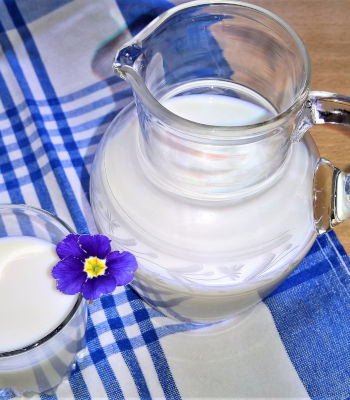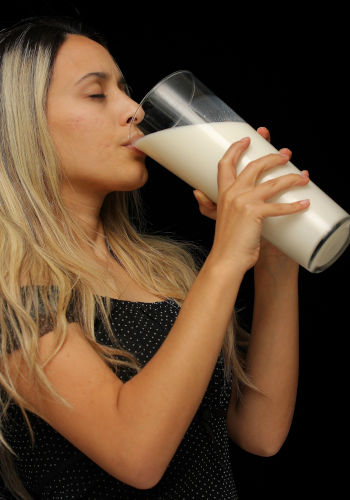We are reader-supported. When you buy through links on our site, we may earn an affiliate commission. Learn more
Drinking Milk Every Day! Is It Good Or Bad For You?

Whether or not drinking milk every day is healthy for you depends on a number of reasons.
For example your age, your sex and naturally how much milk you drink.
Milk is a wholesome food since it contains vital proteins, calcium, vitamins, carbohydrates, fats, and minerals essential for your health and your body.
In western cultures, milk is commonly seen as a vital part of a balanced diet because of all the essential nutrients it can provide.
In this article, we dig deep in the research of milk from cows.
You can also find other kinds of milk in stores like soy milk, almond milk or camel milk.
We've written an article where we review 8 different kinds of milk to crown what we believe is the best milk out there.
But in this article, we focus on cows milk.
It's indeed a good source of vitamins and minerals.
If you don't consume dairy it's quite hard to get enough calcium, which is crucial for strong bones.
Even though you can find calcium in other kinds of food.
You can find 100% real whole milk #ad on Amazon if you can't find it in you local store. It comes in a perfectly sized 8 ounce carton which makes it easy to portion or to put in your child's lunchbox.
Table of Contents
Why Is Cow's Milk Good For You?

Milk is a nutrient-rich beverage that may benefit your health in several ways.
The nutritional profile of milk is impressive.
It contains lots of vitamins, minerals, protein, healthy fats and antioxidants.
If you like milk and aren't allergic to it, most experts say it's fine and arguably even healthy to continue drinking milk, at least in moderation.
Can milk make you gain weight?
You might have heard that milk will make you gain weight.
But that's not been proven. In fact, there are studies that point to the opposite.
Milk contains a variety of components that may contribute to weight loss and prevent weight gain. For example, its high-protein content helps ◳ you feel full for a longer period of time, which may prevent overeating.
Milk naturally contains growth hormone which is designed to make animals get bigger.
But there's no proof that the amount found in milk would contribute to obesity.
Of course, if you eat ice cream every day or put cheese on everything, you might gain weight.
But if you eat dairy, even full-fat dairy, in small amounts, it might actually help you slim down.
Milk is good for your bones

Drinking milk has long been associated with healthy bones.
But is it true? Yes, it actually is.
Milk contains lots of calcium that are good for your bones.
Bones need calcium
Randomized control trials have been conducted in which the diet is deliberately fortified with calcium, sometimes through drinking milk.
To show how calcium works in the body.
This means that you can get strong bones by eating other foods than dairy products.
Although dairy products including plain milk makes it far easier to get that daily boost of calcium because of its high calcium content.
A revaluation of evidence was made on the subject of calcium, dairy products, and bone health in children and young adults. ◳ National Library of Medicine, Bethesda researched studies published on the relationship between milk, dairy products, or calcium intake and bone mineralization or fracture risk in children and young adults, from 1 to 25 years.
They reviewed 58 studies.
The researchers found evidence that to some extent supports nutritional guidelines specifically aimed at increasing milk or other intakes of dairy products to promote child and adolescent bone mineralization.
Osteoporosis and bone fractures
Drinking milk and dairy products may prevent osteoporosis and bone fractures.Dairy products are the best sources of calcium, and calcium is the main mineral in bones.
Osteoporosis is a progressive disease in which bones deteriorate, losing mass and minerals over time.
Osteoporosis is much more common in women than in men, especially after menopause.
It significantly increases the risk of bone fractures.
There are several studies that show that increased calcium intake in premenopausal women may prevent age-related bone loss.
That dietary modification in the form of dairy products retards vertebral bone loss ◳ in premenopausal women.
Cows milk have from time to time been criticized as a cause of multiple health problems, including an increased risk of fractures.
That prompted a group of researchers in 2017 to take a closer look at the topic.
They published Osteoporosis: Is milk a kindness or a curse? ◳
They found out that in all age groups, including children and postmenopausal women, consuming cows milk, powdered milk supplements, or whey protein is associated with lower bone turnover and unchanged or higher bone mineral density values.
The researchers concluded that at the time of the study, there is no conclusive evidence that we should modify our current level of consumption of cows milk.
Good for your muscles
There are two main types of protein found in milk, casein and whey protein.
Both are considered high-quality proteins.
The milk protein contains all nine essential amino acids.
It may help reduce age-related muscle loss and promote muscle repair after exercise.
You can find several different studies that shows that that drinking milk after a workout can decrease muscle damage, promote muscle repair, increase strength and even decrease muscle soreness in both men ◳.
Could Cow's Milk Be Bad For You? It Might Be!

Most research you find about milk point to the benefits you get by drinking it.
But there is especially one large study that's gained a lot of attention.
They don't give conclusive evidence that milk is bad for you, but the study points to the direction that drinking too much milk can actually shorten your life!
The study was made in Sweden 2017 by researchers at Uppsala University and Karolinska Institutet who studied milk drinking among nearly 106,000 middle-aged and older women and men.
They published "Milk, Fruit and Vegetable, and Total Antioxidant Intakes in Relation to Mortality Rates: Cohort Studies in Women and Men". ◳
According to the study, large consumption of milk might lead to an early death.
Mortality rates were highest in persons with high consumption of milk combined with low consumption of fruits and vegetables.
Study showed differences between men and women
The gradient of risk with increasing milk consumption was more pronounced in women than men.
The risk of dying an early death was lowest in women who drank a maximum of one glass milk a day, but ate fruit and vegetables at least five times a day.
The risk of dying an early death was almost three times higher for women who drank at least three glasses of milk a day and ate fruit and vegetables at most once a day.
Men who drank at least three glasses of milk per day, the risk of premature death was just over 30 percent higher than for men who rarely or never drank milk.
The intake of fruit and vegetables did not seem to affect the men in the study as much as the women.
Milk consumption can induce oxidative stress?
The researchers postulated that milk consumption induces oxidative stress through the galactose component of lactose.
This is because galactose supplementation results in premature aging in animals through induction of oxidative stress and inflammation.
Why women are more sensitive to milk then men the researchers explained by pointing out that a difference in sensitivity to galactose exposure between men and women has been identified experimentally.
Galactose elimination capacity is also higher in men than in women but does declines with increasing age.
Higher intake of fruits and vegetables has been able to reduce oxidative stress and inflammation in the body, which can promote longevity and reduce the risk of cardiovascular disease and certain cancers.
The researchers pointed out that the results might not apply to people of other ethnic origins, such as those with a high prevalence of lactose intolerance, or to children and adolescents.
The researchers didn't give recommendations about drinking milk, but they said that their observational results question the value of recommending high consumption of milk, especially in women not meeting the recommended requirements for fruit and vegetable intake.
However, they clearly pointed out that the study would need to be replicated before it was used to provide dietary advice.
Lactose intolerance
A true dairy allergy is relatively rare, but there are people that are lactose intolerant.
This means that they can't properly digest the primary sugar, lactose, found in milk.
Lactose intolerance can trigger unpleasant symptoms like stomach cramps, gas, or diarrhea when consuming foods with lactose.
Levels of lactose intolerance vary between individuals
It's the carbohydrates in the milk that are called lactose and in order for these to break down in the body, an enzyme is required in the intestine, which is called lactase.
In the Nordic countries, for example, almost everyone has this enzyme, because we've been drinking milk for hundreds of years, while some parts of the population in the rest of the world have not, and therefore can not drink milk.
They are naturally lactose intolerant.
Milk allergy differs from lactose intolerance
A milk allergy is different from lactose intolerance.
It refers to an abnormal immunologic reaction, in which the body's immune system produces allergic antibodies, such as immunoglobulin E (IgE).
Those with a milk allergy must strictly avoid milk and dairy in any form, including butter, whey, milk, yogurt or cheese.
If you suspect that dairy could be causing symptoms, you should talk to your physician or a dietitian to guide you in an elimination diet or recommend food sensitivity testing.
Conclusion

Cows milk has received a bad reputation in recent years.
I think that's unfortunate. Nutritionally, milk contains large amounts of vitamins and minerals that are essential for you.
The amount of carbohydrate is about 5 grams per deciliter and the amount of protein is 3.5 grams per deciliter.
The amount of fat varies depending on the variety you choose.
So, we have concluded that milk is good to drink. For active children, it is a great way to get nutrients.
Especially if they are in some kind of period of food refusal.
People who exercise can also benefit from drinking milk to help cover their large energy needs.
As a recovery drink, milk is also good because it has a good balance of carbohydrates and protein.
Studies show us that you should drink milk in moderation if you like it and tolerate it. But you shouldn't over consume it.
It can be a bit tricky knowing how much milk you eat with your cereal, or in your coffee or tea, or in cooking.
Try to figure out how much milk you usually drink and remember to drink with moderation!
Frequently asked questions about milk
Can I drink a glass of milk every day?
Yes, if you don’t exceed one glass a day, it should be ok to drink milk no matter your age or your sex, according to research. Especially if you eat fruit and vegetables every day.
Can milk make you gain weight?
No, according to research there are several studies that point to the opposite. Milk contains a variety of components that may contribute to weight loss and prevent weight gain. For example, its high-protein content helps you feel full for a longer period of time, which may prevent overeating.
Is milk good for your bones?
Yes, milk contains calcium which is vital for your bones. Of course there are other ways for you to get calcium, but milk and other dairy products are not only readily available but also one of the best sources of calcium.
Can you be allergic to milk?
Yes, you can be allergic to milk, but it’s quite rare. When you have a milk allergy you must strictly avoid milk and dairy in any form. What’s more common is lactose intolerance. Lactose intolerance isn’t the same thing as milk allergy. With lactose intolerance your body can’t properly digest the milk sugar, lactose, but you’re still able to, in many cases, eat dairy products with for instance less lactose.


